Clifford Garstang's Blog, page 29
January 25, 2021
I’ve Got Questions for Sally Whitney
Editor’s Note: This exchange is part of a series of brief interviews with emerging writers of recent or forthcoming books. If you enjoyed it, please visit other interviews in the I’ve Got Questions feature.
 When Enemies Offend Thee by Sally WhitneyWhat’s the title of your book? Fiction? Nonfiction? Poetry? Who is the publisher and what’s the publication date?
When Enemies Offend Thee by Sally WhitneyWhat’s the title of your book? Fiction? Nonfiction? Poetry? Who is the publisher and what’s the publication date?When Enemies Offend Thee is a novel published by Pen-L Publishing on March 1, 2020.
In a couple of sentences, what’s the book about?When Enemies Offend Thee is the story of a woman who vows to get justice on her own when police refuse to charge the man who sexually assaulted her. Her attempts to get even take her to dark places, causing her to question whether she can ever again be the woman she wants to be.
What’s the book’s genre (for fiction and nonfiction) or primary style (for poetry)?Thriller/suspense
What’s the nicest thing anyone has said about the book so far?There’ve been a lot of nice reviews, but I think the comment below from Mallory Anne-Marie H., a NetGalley reviewer, is one of the most meaningful.
“This could have so easily been yet another account of #Metoo, but the author chose to really dig deeply into her characters and to examine the backdrop of their culture, economy, history. Reading what happened to protagonist Clementine, the ugly crime and the ugly aftermath, frightened and infuriated me. But the novel didn’t drop us there. What ensues is a marvel of character evolution, acknowledgment that joy can come eventually after grief.”
What book or books is yours comparable to or a cross between? [Is your book like Moby Dick or maybe it’s more like Frankenstein meets Peter Pan?]The Girl With the Dragon Tattoo meets Gone Girl. Clementine Loftis, the protagonist of When Enemies Offend Thee, has the righteous furor of Lisbeth Salander in The Girl With the Dragon Tattoo plus the cunning persistence of Amy Dunne in Gone Girl.
Why this book? Why now?Fortunately, more women are speaking out about sexual assault than ever before. I wanted to explore how I would react in that situation and also to challenge other women to think about it and how far they would go to right any wrong that had been done to them.
Other than writing this book, what’s the best job you’ve ever had?Teaching creative writing in the continuing education program at Johnson County Community College in Kansas. It wasn’t a particularly lucrative job, but I enjoyed it immensely.
What do you want readers to take away from the book?I hope readers remember When Enemies Offend Thee as a compelling story that led them to question what their own reactions would be in this or a similar situation and whether or not anyone can know for sure what they would do.
What food and/or music do you associate with the book?Poppy seeds, raw chicken, soft-dip ice cream, and lobster all play important roles in the story.
What book(s) are you reading currently?Americanah by Chimamanda Ngozi Aditchie and The Last Days of Night by Graham Moore. They’re very different, but I’m enjoying them both.
 Sally Whitney
Sally WhitneyLearn more about Sally on her website.
Follow her on Facebook.
January 22, 2021
I’ve Got Questions for Terri Kirby Erickson
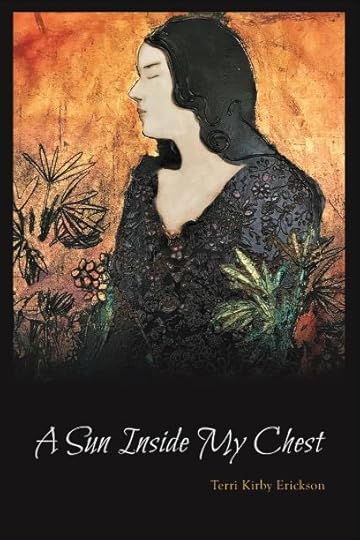 A Sun Inside My Chest by Terri Kirby EricksonWhat’s the title of your book? Fiction? Nonfiction? Poetry? Who is the publisher and what’s the publication date?
A Sun Inside My Chest by Terri Kirby EricksonWhat’s the title of your book? Fiction? Nonfiction? Poetry? Who is the publisher and what’s the publication date? A Sun Inside My Chest, poetry, Press 53, October 8, 2020
In a couple of sentences, what’s the book about?Author Emily Herring Wilson had this to say: “Terri Kirby Erickson’s sixth book, dedicated ‘for love,’ is a world I want to live in: generous people, beautiful flowers, birds of every feather, landscapes of mountains and sea, and love of every kind, from passionate romance to family and friends, hawks and owls and herons and clouds and outdoor cathedrals.”
What’s the book’s genre (for fiction and nonfiction) or primary style (for poetry)?Poetry, free verse
What’s the nicest thing anyone has said about the book so far?“I think this is your best book and that’s saying something.” One always hopes that every book is better than the last, rather than the other way around!
What book or books is yours comparable to or a cross between? [Is your book like Moby Dick or maybe it’s more like Frankenstein meets Peter Pan?]It is comparable to any collection of poetry that was written with the intention of celebrating the “ordinary” and inviting readers to engage with the poems in ways that are meaningful for them.
Why this book? Why now?A Sun Inside My Chest is the product of almost three years of writing, and many changes occurred in my life during and after this time period, including my father’s long illness, his death, and six months later (after the manuscript was in the hands of my publisher), the sudden death of my mother. I was incredibly close to my parents and trying to come to terms with their deaths continues to be an excruciating process. And while there are poems in this book that do speak of loss and suffering, most of the poems reflect my passionate adoration of the gorgeous world in which we live. Although pain and hardship are part of every living (and therefore, mortal) creature’s earthly existence, I believe the best way for me to honor my parents and their abiding love, is to nourish and to mirror my capacity for joy and wonder and gratitude in my life and in my work.
Other than writing this book, what’s the best job you’ve ever had?The best job I ever had was as the assistant to the Director of Vascular Ultrasound Research at Wake Forest Baptist Medical Center School of Medicine. I loved my “boss” and all of my co-workers, and one of them has been like a sister to me for decades. The people I worked with every day—they are what made this job so great. As for the actual work—being a radio copywriter at various radio stations in the late seventies and early eighties, was the most fun. I wrote advertising copy for everything from tires to barbecue!
What do you want readers to take away from the book?My hope is for the poems to move readers in such a way that they become more mindful of and pay closer attention to the “present moment” in their own lives. Poetry is a kind of magic, I think, when it does what it is supposed to do—which in my opinion, is to inspire readers to think and to feel, and to know that while we may sometimes feel alone in this big world of ours, we are all connected and more alike than we are different.
What food and/or music do you associate with the book?My grandma’s buttery pound cakes as well as my mother’s spicy shrimp creole—different recipes for sure, but both made with so much love.
What book(s) are you reading currently?I am a huge Alexander McCall Smith fan, and I’m currently reading his latest novel, How to Raise an Elephant, from the No. 1 Ladies Detective Agency series. It is just as wonderful as all the others, and I ordered the hardback edition from Bookmarks in Winston-Salem. I urge everyone to support independent bookstores during these challenging times, along with small presses. Thank you for your excellent questions, Cliff!
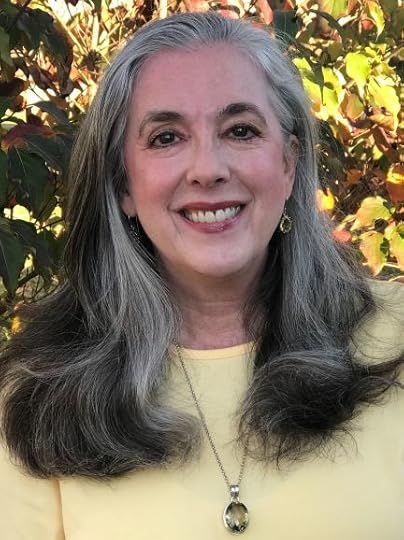 Terri Kirby Erickson
Terri Kirby EricksonLearn more about Terri at her website.
Buy the book from the publisher, Press 53, or from any bookseller. Terri recommends Shermans Maine Coast Bookshops.
Also available online from Bookshop.org, Barnes & Noble, and Amazon.
Editor’s Note: This exchange is part of a series of brief interviews with emerging writers of recent or forthcoming books. If you enjoyed it, please visit other interviews in the I’ve Got Questions feature.
January 20, 2021
I’ve Got Questions for Jane Bernstein
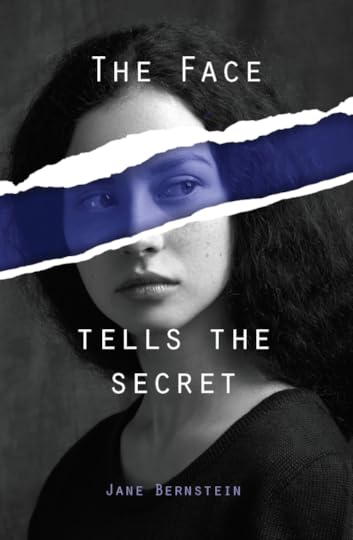 The Face Tells the Secret by Jane BernsteinWhat’s the title of your book? Fiction? Nonfiction? Poetry? Who is the publisher and what’s the publication date?
The Face Tells the Secret by Jane BernsteinWhat’s the title of your book? Fiction? Nonfiction? Poetry? Who is the publisher and what’s the publication date? The Face Tells the Secret is a novel published by Regal House Publishing in October 2019. Named a Best Book of 2020 by Hadassah Magazine.
In a couple of sentences, what’s the book about?The Face Tells the Secret is about a woman who knows absolutely nothing about her family history until her boyfriend arranges for a surprise visit from her estranged mother, who lives in Tel Aviv. That visit is the start of a tumultuous journey, in which she first learns about a profoundly disabled sister who lives in a residential community in the Galilee and later begins to unearth disturbing long-held family secrets.
What’s the book’s genre (for fiction and nonfiction) or primary style (for poetry)?Upmarket fiction.
What’s the nicest thing anyone has said about the book so far?“Gorgeously written, and deeply moving, this is a book about the ways we are loved—and more importantly—the ways we let ourselves love.”—Caroline Leavitt
What book or books is yours comparable to or a cross between? [Is your book like Moby Dick or maybe it’s more like Frankenstein meets Peter Pan?]Oops. I can’t answer this question.
Why this book? Why now?Suzanne Kamata wrote this: “Who should we care for?” asks Roxanne, the narrator of The Face Tells the Secret. “How much of our lives should we spend looking after others? When do we turn away to protect ourselves?” These are questions that many of us face, especially now, when so many women work outside the home and multi-generational families rarely live together.
Other than writing this book, what’s the best job you’ve ever had?That’s an easy question! I’ve been a member of the Creative Writing Program at Carnegie Mellon University since 1991, where I get to share my passion for books and movies and nurture young writers.
What do you want readers to take away from the book?I hope readers enjoy The Face Tells the Secret and that the characters and themes resonate with them.
What food and/or music do you associate with the book?Also a tough one. I do reference the Police, singing Roxanne, and I guess I’d say falafel, since the book is mostly set in Tel Aviv.
What book(s) are you reading currently?I’m just about done with The Mersault Investigation, loved Apeirogon, by Colum McCann, and became a big Sally Rooney fan.
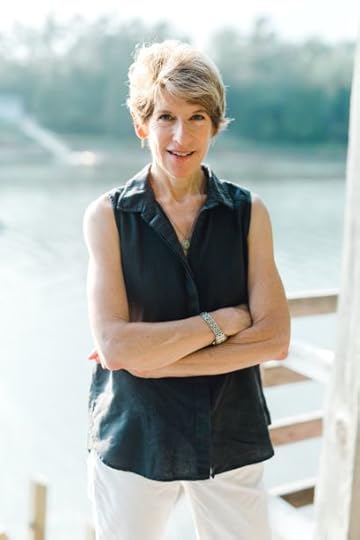 Jane Bernstein
Jane BernsteinLearn more about Jane at her website.
Your local bookseller can order The Face Tells the Secret. The book can also be purchased online via Bookshop.org, a consortium that supports independent booksellers. Also available from Powells.com and Amazon.
Editor’s Note: This exchange is part of a series of brief interviews with emerging writers of recent or forthcoming books. If you enjoyed it, please visit other interviews in the I’ve Got Questions feature.
January 19, 2021
Prolific? Not really.
When I told people that I had a new novel being published this year, as I did on this blog recently, revealing the beautiful cover, a lot of folks commented on how prolific I was. With three books published in a span of just two years, it does seem that way, but really, it’s an illusion.
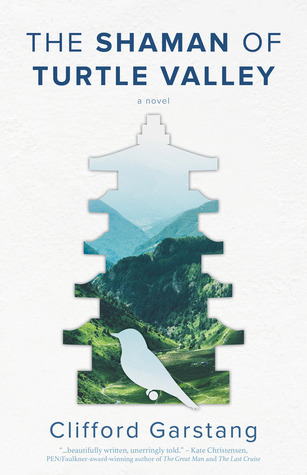
My first novel, The Shaman of Turtle Valley, was published by Braddock Avenue Books in May of 2019. That’s almost eight years after I finished a manuscript that I deemed ready for submission to agents and almost seven years after the publication of What the Zhang Boys Know, my novel in stories that was published in the fall of 2012 by Press 53. (That book was largely finished by the fall of 2010 and spent a year or so on submission to large publishing houses by my then-agent before Press 53, which in 2009 had published my first story collection, In an Uncharted Country, picked it up.)
The novel’s route to publication was long. I landed an agent for it in the fall of 2011, we worked on a round of edits, and by mid-2012, that agent and I had parted ways. (Long story.) The book then languished because I had other things going on, including the publication of my novel in stories and subsequent promotional appearances for that book. In 2013, when all that had died down, I worked on another revision to the manuscript, looked for a new agent, and also continued to work on another novel. (Most writers I know are always working on one project or another, or several at the same time.)
Just before Christmas 2013, I landed a new agent for Shaman and, after a round of minor revisions, we went out on submission in January 2014. Unlike a lot of agents, he really persevered and did, I think, four rounds of submissions before throwing in the towel. By that time, mid-2016, more than two years after we started, I had finished a new novel (which is the book coming out only now). My agent suggested some revisions on that book, which I made, and while he was sending it out to publishers, he encouraged me to submit the earlier novel to small presses, which I did.
At that point, late summer of 2016, with two books “finished,” I was beginning to work on a new novel, more ambitious than anything I had done so far. (Spoiler alert: It’s now January of 2021 and I’m STILL working on that novel, with no end in sight.)
In mid-2017, deep into work on the new project, I received an offer from Braddock Avenue Books to publish The Shaman of Turtle Valley. Because there is not much money involved in publishing with a small press, and because the agent didn’t hold out much hope for the new book landing at a major publisher, we agreed to end our relationship. No hard feelings. He worked hard for me and I appreciated his efforts, but it just wasn’t worth it to him to continue.
While Shaman slowly worked its way through the publishing process at Braddock, I did more edits on the next novel. Because the book had already been agented and had been submitted to major publishers, I believed—based on advice from writers, editors, and agents—that my options were either to submit the book as it was then to independent presses or do a substantial revision (with name change) and then start over with agents. In essence, I took steps toward doing both. I made submissions to small presses, but I also engaged a developmental editor to advise me on how I might revise the book. In the summer of 2018, I had that editor’s suggestions in hand and began to revise. And just when I started on those revisions, I received an offer from Regal House Publishing to publish the novel in its previous form. Now, there’s a dilemma for you. The editor’s suggestions for revision had resonated with me, but a publisher was interested in the un-revised book.

Solution: come clean with the publisher. I spoke with the publisher’s Editor-in-chief and described the changes I planned to make—which were substantial—and the editor agreed completely, even indicating that she would have made similar suggestions. So I signed a contract with Regal House for Oliver’s Travels and spent the next couple of months making the changes. At that point, late summer 2018, the edits for Shaman (scheduled to come out in May 2019) were done, and now the manuscript for the new novel was also done, and I began to get more serious about the new project I’d been working on since 2016.
In early 2019, however, I had the unexpected opportunity to go to an arts colony for a week. Instead of pushing ahead on the novel, I used that concentrated period to work on assembling my uncollected short stories into a manuscript, to see if I might have enough for a collection. I didn’t, quite, but in addition to the stories I did have (mostly published but as yet uncollected and a few unpublished) I also had a bundle of ideas for new material, and in short order I had not only produced several short stories to polish and start submitting to literary magazines, I also had a draft of a new book. That was one of the most productive weeks of writing I’ve ever had.
The Shaman of Turtle Valley appeared in May 2019, seven and a half years after I’d finished it, and six and a half years after the publication of my previous book. It hadn’t taken me very long to write, in retrospect, maybe just two years. Finding a publisher and getting the book out took much, much longer.

Shortly after Shaman came out, Press 53 offered to publish the new collection of short stories. The timing was tricky, however, because we didn’t want it to appear too close to either of the two novels. In the end, we arranged to bring out House of the Ancients and Other Stories a full year after Shaman, so it came out in May 2020, in the middle of the pandemic. Not great timing.
Oliver’s Travels had been scheduled to appear in the fall of 2020, but the publisher understood the problem of being too soon after the story collection, so publication was pushed to May of 2021, almost five years after I finished that book and sent it to my agent.
Publishing three books in the span of two years may seem like I’m being a prolific writer, but truthfully it’s all just the whim of the publishing gods. What I will take credit for, however, is perseverance, which the real key to the industry.
January 18, 2021
I’ve Got Questions for Vicki Lane
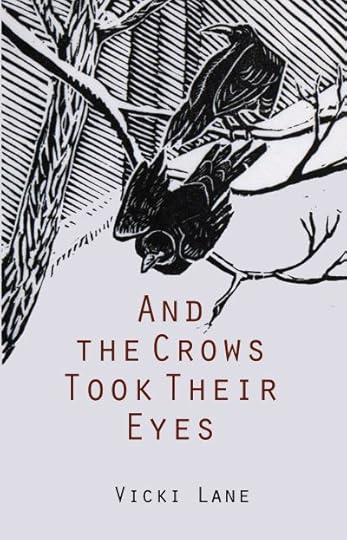 And the Crows Took Their Eyes by Vicki LaneWhat’s the title of your book? Fiction? Nonfiction? Poetry? Who is the publisher and what’s the publication date?
And the Crows Took Their Eyes by Vicki LaneWhat’s the title of your book? Fiction? Nonfiction? Poetry? Who is the publisher and what’s the publication date?And the Crows Took Their Eyes is historical fiction, published by Regal House Publishing on October 16, 2020.
In a couple of sentences, what’s the book about?In bitterly divided western North Carolina, Confederate troops execute thirteen men and boys suspected of Unionism. The Shelton Laurel Massacre, as it came to be known, is a microcosm of the horrors of civil war—neighbor against neighbor, violence at one’s own front door, and enduing repercussions.
What’s the book’s genre (for fiction and nonfiction) or primary style (for poetry)?Literary/ historical fiction.
What’s the nicest thing anyone has said about the book so far?“In And the Crows Took their Eyes Vicki Lane has done nothing less than commit an act of mountain sorcery. Through her the voices of the dead rise up out of the hollows of Madison County, North Carolina telling a story as tragic and urgent as it was 150 years ago.” — Tony Earley, author of Jim the Boy
What book or books is yours comparable to or a cross between? [Is your book like Moby Dick or maybe it’s more like Frankenstein meets Peter Pan?]Cold Mountain is the closest I can come—similar setting, a soldier coming home, a woman left behind. I purposely avoided reading novels about the Civil War while I was writing my book, not wishing to be influenced. So I can’t really point to any others.
Why this book? Why now?Since I live in the county where the massacre occurred, the story has been nagging at me for many years. And in 2016, as the country became more and more polarized, I realized that the story of neighbor against neighbor and the tragic consequences had a compelling relevancy.
Other than writing this book, what’s the best job you’ve ever had?I enjoy leading writing workshops; I even enjoy editing other folks’ novels.
What do you want readers to take away from the book?I hope the book makes readers reflect on the horrors of civil war—on the home front as well as the battlefield—and the dangers of demonizing “the other.”
What food and/or music do you associate with the book?Cornbread, cornpone, hog meat are standard fare in the novel and are still a way of life in western North Carolina. As for music, the Civil War era song “Lorena” winds its way through the novel. This haunting melody and poignant words were sung by both the Blue and the Gray.
What book(s) are you reading currently?Greenwitch, a YA by Susan Cooper.
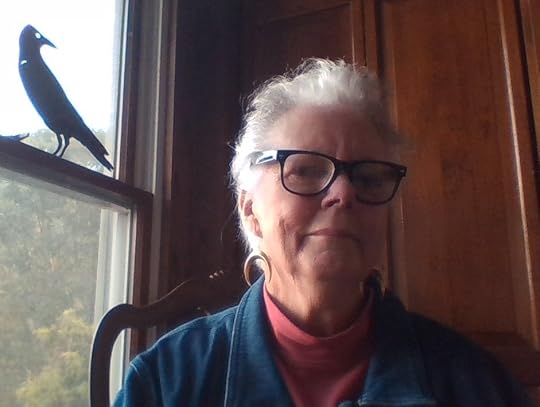 Vicki Lane
Vicki LaneTo learn more about Vicki, visit her website and check out her blog.
Follow Vicki on Facebook.
Buy the book at Indiebound, Malaprops, City Lights, Amazon, or directly from the publisher, Regal House Publishing.
Editor’s Note: This exchange is part of a series of brief interviews with emerging writers of recent or forthcoming books. If you enjoyed it, please visit other interviews in the I’ve Got Questions feature.
January 15, 2021
I’ve Got Questions for Karin Cecile Davidson
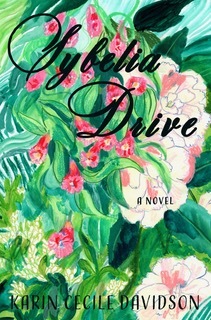 Sybelia Drive by Karin Cecile DavidsonWhat’s the title of your book? Fiction? Nonfiction? Poetry? Who is the publisher and what’s the publication date?
Sybelia Drive by Karin Cecile DavidsonWhat’s the title of your book? Fiction? Nonfiction? Poetry? Who is the publisher and what’s the publication date? Sybelia Drive; Fiction; Braddock Avenue Books, October 6, 2020
In a couple of sentences, what’s the book about?Here’s the Poets & Writers “New Titles” description:
Brilliantly structured and morally complex, Sybelia Drive questions American life within the multi-faceted mirror of wartime. As the 1960s cross over into the 70s, LuLu and Rainey rush past childhood innocence into young adulthood, the Vietnam War forced into the very fabric of their town. “A lush portrait of friendship and family.”—Aimee Bender, author of The Butterfly Lampshade
What’s the book’s genre (for fiction and nonfiction) or primary style (for poetry)?Literary Fiction / Historical Fiction / Subjects: Coming of Age, Homefront, Vietnam War
What’s the nicest thing anyone has said about the book so far?Lots of beautiful praise for Sybelia Drive!
“Karin Cecile Davidson has written a keenly-observed novel about the persistence of family ties and friendships, the press of history on private lives, and the tug of both home and away. At once delicate in its prose and bold in its vision, Sybelia Drive is a luminous debut.” —Elizabeth Graver, author of The End of the Point
Karin Cecile Davidson’s Sybelia Drive is [a] mosaic, a tale of friendship between two girls set in a time and place that rise from the page—vivid and lush and tinged with memory. In Davidson’s hands, this slice of the late 1960s in Central Florida comes alive, her characters complex and breathing on the page. A masterful novel for those who appreciate rich, delicious writing. – Hilary Zaid, author of Paper is White
This author knows her characters’ world and this debut novel captured me with its strong sense of place—Sybelia Drive—a beautiful Florida neighborhood surrounding a lake—and the organic cast of characters who are forever connected by it. Davidson’s lush sentences ring with precision, heart, and poetry. – Jennifer Genest, author of The Mending Wall
Plus the gorgeous blurbs from Aimee Bender, Margot Livesey, and Steve Yarbrough!
What book or books is yours comparable to or a cross between?In terms of revealing multiple voices, Sybelia Drive’s structure resembles that of Louise Erdrich’s Love Medicine, Jennifer Egan’s A Visit from the Goon Squad, Elizabeth Strout’s Olive Kittredge. But in thinking of storyline and setting, of voice and tone, the novel may have more in common with books set in the South or books about war or coming-of-age novels. Florida and Vietnam; the late 60s and early 70s; kids, teenagers, and their parents. Sections of Joan Silber’s The Size of the World, Michael Cunningham’s A Home at the End of the World, and Stephanie Vaughn’s Sweet Talk come to mind.
Why this book? Why now?The seed of this book came from Rainey’s chapter, “Forever and a Day,” written as a story when the United States sent troops to Afghanistan and Iraq. Once I realized I was writing a novel, I felt the need to examine the era and the war that had defined my generation.
Growing up in Florida and Louisiana during the Vietnam War, I knew many families who were affected by the draft. By the time I was a teenager, I met men, really boys, not much older than myself, who had served. Later, I realized the quietude that many of them had was due to their experiences “in country” and wanted to explore this further.
As a historical novel, I hope the book is timeless, even while it is set within a specific era.
Other than writing this book, what’s the best job you’ve ever had?Aside from writing, my work has included river running on the Colorado River in the Grand Canyon, butchering Dungeness crabs and working the salmon and halibut lines in Sitka, working as a sous-chef in several New Orleans restaurants, housekeeping on the Mississippi Queen Paddlewheel Steamboat, leading historical tours in Berlin, as well as working at a Long Island macrobiotic deli, an Iowa City co-op, and a Columbus yoga studio. I worked at Narrative Magazine as assistant editor, promote-to editor, and finalist editor from 2010-2014, and since then I’ve been an Interviews Editor for Newfound Journal and have interviewed over fifty writers and artists. Of all of these jobs, I’d say I most love interviewing writers, as the conversations are always illuminating.
What do you want readers to take away from the book?I’d hope for all readers of this novel that they become deeply immersed in the details, that they are as surprised by the characters as I was in writing them, and that they think about the storylines long after they’ve finished the last passages. I’d hope they’d consider how these fictional lives came from a time in our collective history that was vibrant and violent and led to enormous change. Politically, we are still evolving as a nation. Sybelia Drive is in part a reflection of that period.
What food and/or music do you associate with the book?Biscuits just out of the oven, high and light. Rashers of bacon. Eggs sunny-side up. Homemade marmalade. Barbecued shrimp with hushpuppies and long-necked bottles of beer. Powdered doughnuts, the kind that come in cellophane, the package crinkling and the sugar dusting fingers, lips, clothes. Blackberry pie, latticed with golden, flaky pastry, eaten right out of the pan. Cocktails served with citrus and bright little umbrellas: lime daiquiris and salty dogs.
What book(s) are you reading currently?I’m re-reading Elizabeth Graver’s novel, The End of the Point, and am slowly making my way through David Baker’s poetry collection, Swift. By the time this interview is published, I hope to have made my way to Randall Kenan’s If I Had Two Wings, Bobbie Ann Mason’s Dear Ann, Margo Orlando Littell’s The Distance from Four Points, Gwen Goodkin’s A Place Remote, Diane Zinna’s The All-Night Sun, and CJ Hauser’s Family of Origin. I’m dreadfully behind on my mountain of reading. A beautiful mountain.
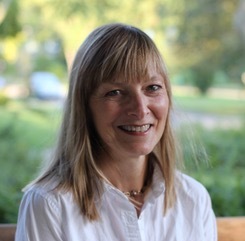 Karin Cecile Davidson
Karin Cecile DavidsonLearn more about Karin at her website.
Follow her on Facebook, Twitter, and Instagram.
Buy the book from: Bookshop, Braddock Avenue Books, Pagination Bookshop, Garden District Book Shop.
Editor’s Note: This exchange is part of a series of brief interviews with emerging writers of recent or forthcoming books. If you enjoyed it, please visit other interviews in the I’ve Got Questions feature.
January 13, 2021
I’ve Got Questions for P. A. Duncan
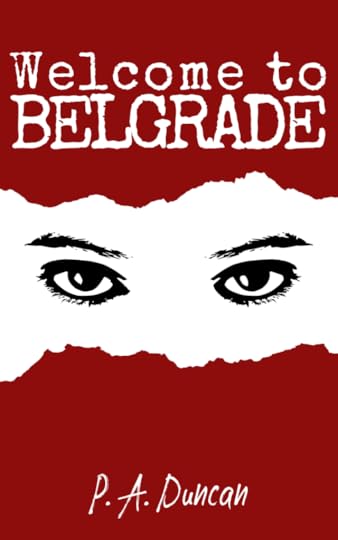 Welcome to Belgrade by P.A. DuncanWhat’s the title of your book? Fiction? Nonfiction? Poetry? Who is the publisher and what’s the publication date?
Welcome to Belgrade by P.A. DuncanWhat’s the title of your book? Fiction? Nonfiction? Poetry? Who is the publisher and what’s the publication date?Self-Inflicted Wounds 1: Welcome to Belgrade; Fiction, Unexpected Paths Publishing, October 1, 2020
In a couple of sentences, what’s the book about?Welcome to Belgrade is book one of a trilogy dealing with a series of political murders in the then Yugoslavia in the late 1990s and a significant change in leadership in the Balkans in 2000. My main protagonists, a husband and wife spy team, have to stop the murders and convince a reluctant opposition politician to run against Slobodan Milosevic.
What’s the book’s genre (for fiction and nonfiction) or primary style (for poetry)?Espionage/Historical Fiction
What’s the nicest thing anyone has said about the book so far?A reader messaged me and said she had learned more history from the book than she ever learned in school. My work here is done.
What book or books is yours comparable to or a cross between? [Is your book like Moby Dick or maybe it’s more like Frankenstein meets Peter Pan?]Maybe a mash-up between John le Carre’s Agent Running in the Field and Alan Furst’s Spies of the Balkans.
Why this book? Why now?I like to write about significant, recent historical events and publish around their anniversaries. The year 2020 was the 20th anniversary of the “Bulldozer Revolution” in Yugoslavia when Slobodan Milosevic lost an election he couldn’t rig and was pushed from power. I actually started the trilogy back in 2001 (at the suggestion of an anonymous friend from an equally anonymous intelligence agency) and finished it to my (and my editor’s) satisfaction about three years ago.
Other than writing this book, what’s the best job you’ve ever had?It’s a toss-up between editor of FAA Aviation News magazine and Chief of Staff of the FAA’s Flight Standards Service.
What do you want readers to take away from the book?From Welcome to Belgrade and the other two books of the trilogy, I hope, particularly now, they learn that democracy wins out even when it appears otherwise and that sometimes you have to fight for democracy, not against it.
What food and/or music do you associate with the book?Eastern European cuisine: cheese pastries, goulash, red pepper jam, plum brandy
Music: Heavy metal or anything by Balkan Beat Box
What book(s) are you reading currently?Giants: The Parallel Lives of Frederick Douglass and Abraham Lincoln by John Stauffer (nonfiction); Troubled Blood by Robert Galbraith (fiction)
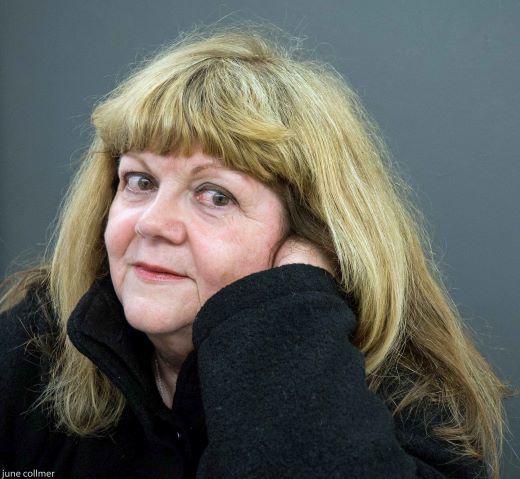 P. A. Duncan
P. A. DuncanLearn more about Phyllis on her website.
Follow Phyllis on Facebook and Twitter.
Buy Welcome to Belgrade and other titles by P.A. Duncan on Amazon.com.
January 11, 2021
I’ve Got Questions for Lily Iona MacKenzie
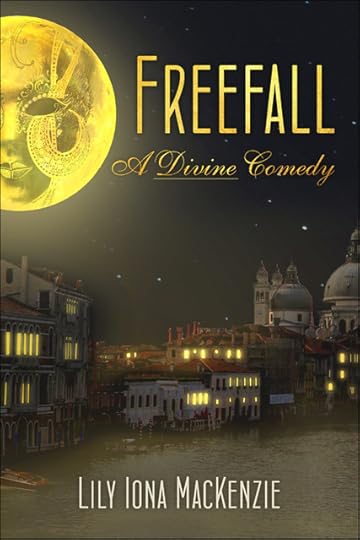 Freefall by Lily Iona MacKenzieWhat’s the title of your book? Fiction? Nonfiction? Poetry? Who is the publisher and what’s the publication date?
Freefall by Lily Iona MacKenzieWhat’s the title of your book? Fiction? Nonfiction? Poetry? Who is the publisher and what’s the publication date?Pen-L Publishing released my novel Freefall: A Divine Comedy on 1/1/19.
In a couple of sentences, what’s the book about?What begins as the story of four old friends reuniting to contemplate their sixtieth birthdays turns into a marvelous, magical mystery tour as they struggle with what they’ve become and what they want to do with their remaining years. An enchanting exploration of religion, art, philosophy, feminism, motherhood, and death—written with style and a heavy dose of humor.
What’s the book’s genre (for fiction and nonfiction) or primary style (for poetry)?Freefall fits into the literary fiction genre with a touch of magical realism.
What’s the nicest thing anyone has said about the book so far?“As a youngster, I read The Adventures of Tom Sawyer and was so taken with it as well as the manner in which Twain presented it and the characters his story revealed that when I reached the end of the book, I quickly turned to the first page and reread it. I was never so captivated by a book again until years later when I read True Grit. The same thing happened when I finished this book. I turned again to the first page and started reading again. I figured then and there that this was it. I now had read all the really fine books and would never again have the experience of rereading one. I was wrong. Freefall fooled me. The characters, and especially the prose, so thrilled me that as soon as I finished it, I couldn’t bear to shut the book and put it on the shelf, so I turned to the beginning and read it again. It’s my hope that those who are lucky enough to read MacKenzie’s great book will have the same magical experience I had with Freefall.”
What book or books is yours comparable to or a cross between? [Is your book like Moby Dick or maybe it’s more like Frankenstein meets Peter Pan?]Sorry, but I can’t think of another novel that’s similar to mine!
Why this book? Why now?Several years ago, I had a reunion in Canada with two of the three women I’d been close to in my late teens but hadn’t seen much of since then. When I got home, I wondered what would happen if all of these women were to meet later in life. They then became the seeds for the characters that inhabit Freefall. Since women’s issues have been prominent in recent years, this narrative seems timely.
I also wrote in my writer’s journal “that there’s a mystery for me in writing this book. Whatever Tillie, the main point-of-view character, has repressed that these women can help recover is a question I’m asking, too. Since I have no idea what it is, I’ll find it out along with the reader. And that’s a kick!”
Other than writing this book, what’s the best job you’ve ever had?The assumption here is that writing this book was the best job I’ve ever had, but, in fact, as most writers know, the process can be torturous! I don’t write from an outline, so each day when I sit at my computer, I have no idea where I’m going. I have to live, then, with the not knowing and the anxiety that accompanies it.
A comparable job might have been when I became the first woman to work at the San Francisco docks and almost got my legs broken. The all-male dockworkers definitely didn’t want women to intrude on their domain, so I didn’t outstay my non-welcome!
What do you want readers to take away from the book?In much of my writing, I attempt to answer the question “what is reality” and how can art and artists help us to understand it. I hope Freefall causes readers to think more deeply about these things.
What food and/or music do you associate with the book?Since two thirds of the novel happen in Venice, pasta would definitely be the main fare. The diners would eat it while a strolling violinist wanders the restaurant playing plaintiff Italian songs.
What book(s) are you reading currently?I plan to start reading Obama’s latest book in the next few days. As for fiction, I just completed the stunning first novel by C Pam Zhang, How Much of These Hills is Gold. It deserves all of the accolades it has received as New York Times and Washington Post notable book of the year.
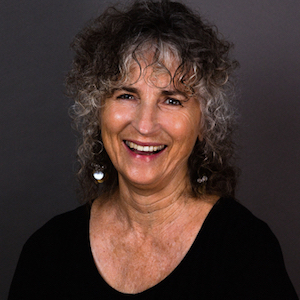 Lily Iona MacKenzie
Lily Iona MacKenzieLearn more about Lily at her website.
Lily’s Facebook Author Page.
Lily on Twitter.
Buy Freefall on Amazon.com.
January 8, 2021
I’ve Got Questions for Gabriel Arquilevich
 Grape! by Gabriel Arquilevich
Grape! by Gabriel ArquilevichWhat’s the title of your book? Fiction? Nonfiction? Poetry? Who is the publisher and what’s the publication date?
Grape! Fiction. Published September 2019, by Fitzroy Books, an imprint of Regal House Publishing.
In a couple of sentences, what’s the book about?
Grape! tells the hilarious and touching misadventures of a sweetly troubled kid, the child of Argentine Jews who are, like their son, adjusting to 1970s California.
What’s the book’s genre (for fiction and nonfiction) or primary style (for poetry)?
Upper middle-grade fiction.
What’s the nicest thing anyone has said about the book so far?
The nicest thing anyone has said: “Grape! is a book of uncommon empathy, a perfect story for every child who wants to be heard and loved for who they are, and for every grown up who wants to understand them.” – J. Cynthia McDermott. EdD. Founder, Horace Mann Upstanders Children’s Book Award
What book or books is yours comparable to or a cross between? [Is your book like Moby Dick or maybe it’s more like Frankenstein meets Peter Pan?]
Grape! lives in the territory of The Secret Diary of Adrian Mole series. Splash in a little Artful Dodger and Curb Your Enthusiasm, and there you go.
Why this book? Why now?
Grape! is based on my own childhood misadventures. I tried to write them straight memoir years ago, but it always fell flat. It wasn’t until I allowed my 11-year-old self to do the storytelling that it came to life.
Other than writing this book, what’s the best job you’ve ever had?
Teaching! Started with sixth grade, then onto high school, and now community college.
What do you want readers to take away from the book?
Deeper empathy for kids with impulse control issues, along with a lot of laughs and maybe even some tears. Also, I want them to jump at the chance to read the sequel, Grape, Again! (due out in 2022!).
What food and/or music do you associate with the book?
1970’s music! Particularly Elton John and “Clair” by Gilbert O’Sullivan.
What book(s) are you reading currently?
I just finished This Boy’s Life, by Tobias Wolff. I’m halfway through Talking to Ourselves, by Andrés Neuman.
 Gabriel Arquilevich
Gabriel ArquilevichLearn more about Gabriel on his website.
Read a review of Grape! at Independent Book Review.
Buy Grape! at Bookshop, Amazon, or wherever books are sold.
January 7, 2021
Introducing: Oliver’s Travels

Introducing Oliver’s Travels, my new novel coming from Regal House Publishing on May 18, 2021.
Ollie Tucker, a recent college graduate and student of philosophy, is obsessed with truth and the source of knowledge, questioning the validity of everything he hears from his parents, his girlfriend, and even the voices inside his head. In pursuit of life’s deeper meaning, he invents an alter ego, Oliver, who lives the adventurous and exotic existence Ollie cannot. But Ollie has another problem—a repressed memory that haunts him. Something involving his Uncle Scotty happened when he was young that threatens to derail his life and his relationships. But the memory is a blur. And what he thinks he does remember he knows is unreliable. The uncertainty is paralyzing. What is the truth? What has his subconscious fabricated? When he learns that his uncle, long-presumed dead, is alive and well, Ollie realizes that to move on with his life he must confront him. Determined to find Scotty and solve the mystery, the trail takes him around the globe. First stop, Singapore! With wry humor and finely wrought prose, Oliver’s Travels is a shimmering coming-of-age story that explores enduring questions: What do we know? How do we know it?
Praise for Oliver’s Travels
In Oliver’s Travels, Clifford Garstang deftly explores the fragility of memory. Ollie, an aspiring writer, must navigate the mundane while, at the same time, imagining a life of fulfillment for his alter ego, Oliver. Garstang displays his gift for contemplation and characterization as Ollie moves undauntedly in search of answers to life’s questions and discovers, in this journey marked with wanderlust, how the past and the present will forever share porous boundaries.
~Jon Pineda, author of Let’s No One Get Hurt
One man’s search for the truth about himself — a tour of his own head that winds up taking him on a tour of the world. A witty, humane meditation on the slippery slope of childhood memory.
~Jonathan Dee, finalist for the Pulitzer Prize, author of The Locals and The Privileges
This is a novel with an edge and a heart, constantly riveting and always smart, not to mention funny! Its humor, in part, derives from the keen intelligence and the pitch-perfect nature of the sterling prose. A must read.
~Fred Leebron, author of Six Figures and Welcome to Christiania
A twisty metafictional and metaphysical tour of the world – and the author’s mind – that examines not only how humans make stories, but how they make us. Fascinating and endlessly surprising.
~Liam Callanan, author of Paris by the Book and Listen & Other Stories
PRE-ORDER NOW AT REGAL HOUSE PUBLISHING: Oliver’s Travels by Clifford Garstang
Also available for pre-order from Bookshop, Barnes & Noble, and Amazon.com.



